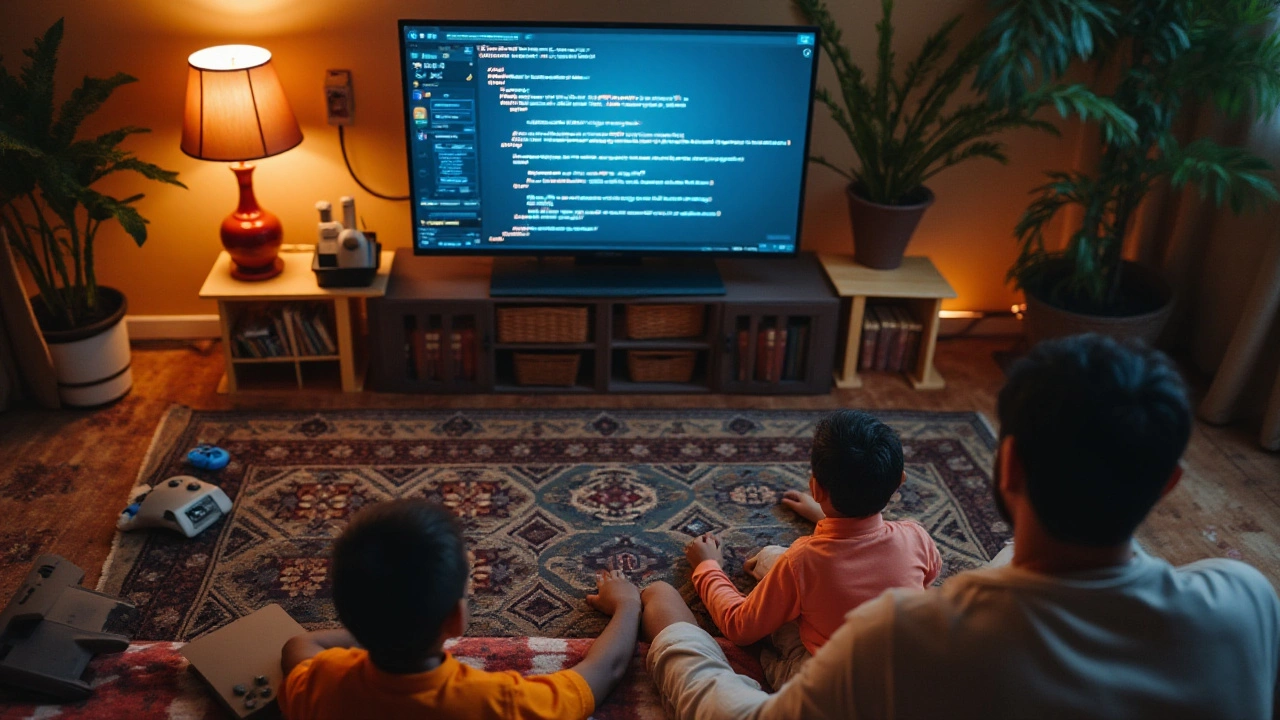Beginning the journey into coding can be one of the most rewarding pursuits one can embark on today. Whether you're looking to shift careers, build your own app, or simply expand your skills, coding provides a world of possibilities. But if you're new to the world of programming, knowing where to start can feel overwhelming.
This guide aims to simplify your entry into coding by offering practical advice and highlighting key steps to kick-start your programming adventure. From selecting the right language to utilizing the best resources, we'll cover it all to ensure you're well-equipped to begin coding with confidence.
- Why Learn to Code?
- Choosing the Right Programming Language
- Essential Tools and Resources
- Tips for Successful Learning
Why Learn to Code?
In today’s digital age, the ability to code is akin to possessing a superpower. It opens up a plethora of opportunities, not just professionally, but also personally. As technology continues to creep into every facet of our lives, understanding the language of computers can provide an edge. For instance, coding can enhance problem-solving skills and foster logical thinking, which are valuable traits in any field, not just the tech industry. This language of the future needs speakers, and the demand is only set to grow. The World Economic Forum has estimated that programming will be one of the most sought-after skills by 2025. So, getting a head start could be particularly beneficial.
Besides the career benefits, learning to program offers a unique sense of empowerment. Imagine having an idea and then having the tools to bring it to life without having to rely on others. Whether it’s developing your own website, creating an innovative app, or automating mundane tasks, coding grants the ability to turn visions into reality. This isn’t just for tech giants or startup founders; hobbyists and enthusiasts can harness the power of code to pursue passion projects, explore new interests, or simply have fun. In essence, coding is a versatile tool that can aid you in numerous unexpected ways.
Additionally, coding can be an exciting and rewarding challenge. Learning it is akin to solving a vast puzzle, where each line of code is a piece in the intricate jigsaw that forms a functioning software or application. This process teaches resilience and patience, given that not every line of code will immediately work as intended. However, this challenge is part of what makes coding so satisfying. There’s a sense of accomplishment in debugging a program or launching something you built from scratch. It's not just about the destination but the journey of learning and growing along the way.
Moreover, coding has become a universal language that transcends boundaries. With remote work becoming the norm, the ability to code can open doors to a global job market, allowing individuals to work with teams across the world, without geographical constraints. According to a study by Stack Overflow, developers in various countries report competitive salaries, meaning that learning to code can lead to lucrative job opportunities, no matter where you are based. In a world that's more connected than ever, coding is a skill that can help you connect with like-minded communities globally.
Steve Jobs once said, "Everyone should learn how to program a computer, because it teaches you how to think." This quote encapsulates the essence of why coding is so crucial—not just for creating technology, but for nurturing cognitive skills that can be applied across various life aspects.
Finally, learning to code equips individuals with a forward-thinking mindset. In a world that is constantly evolving, being adaptable and open to change is key. Coding teaches users how to keep up with the trajectory of tech advancement, as it requires a constant update of skills and knowledge. Thus, jumping into programming provides more than just coding skills; it instills a mindset that embraces change, innovation, and lifelong learning.

Choosing the Right Programming Language
Embarking on a coding journey begins with one vital decision: selecting the right programming language. It can be daunting to decide on just one when there are so many options out there, each with its purpose and community of users. The key here is to align your learning goals with your interests and future aspirations. If your interest lies in developing websites, then languages like HTML, CSS, and JavaScript should be your initial focus. These are not traditional programming languages but are essential for web development. JavaScript, in particular, adds interactivity to webpages, and with frameworks like React and Angular, it's more powerful than ever.
For those drawn towards mobile app development, the buckets split into iOS and Android. Swift is the dominant language for iOS development, while Java and Kotlin are popular for Android. Each has a learning curve, but with tools like Apple's Xcode for Swift or Android Studio for Java/Kotlin, the process is streamlined for beginners. Moreover, for a beginner with an interest in automated tasks or data analysis, Python emerges as a clear winner. Known for its readability and a vast selection of libraries, Python is often praised in the developer community for its versatility.
"Python is the best language to start learning for a beginner as it's easy... startups, enterprises, and academia use Python alike," says Guido van Rossum, the creator of Python.
Programming for game development introduces another set of languages, C# being the most prevalent alongside Unity, a leading game development engine. Aspiring game developers will find the community around C# particularly welcoming with a wealth of tutorial resources. Following this, if speed and performance are the primary considerations, then delving into C++ is advisable; it powers everything from high-frequency trading platforms to modern video games. Understanding C++ gives insight into the inner workings of computers due to its system-level programming capabilities.
An uncommon yet rising segment is the IoT (Internet of Things) systems, which often require different languages like embedded C or even Python. The best advice is to embrace the language that excites you the most, aligned with your personal interests and career ambitions. Remember, each language has its purpose and domain of excellence. Explore open-source projects, contribute when able, and leverage forums like Stack Overflow to expand your understanding. With dedication and the right language, your coding journey is boundless.

Essential Tools and Resources
Starting your coding journey is like venturing into a new world, full of exciting possibilities and challenges. One of the keys to success is equipping yourself with the right tools and resources that will guide you through this exploration. To begin with, having a reliable code editor is fundamental. Tools like Visual Studio Code and Sublime Text are popular among developers due to their user-friendly interfaces and powerful features, such as syntax highlighting and auto-completion. These editors simplify the coding process, making it more intuitive, especially for beginners who are just getting used to writing code.
Another essential element is having access to interactive learning platforms like Codecademy or freeCodeCamp. These platforms provide hands-on coding exercises that help reinforce your understanding and retain what you've learned. They offer structured paths for several languages, from Python to JavaScript, allowing you to choose the one that aligns with your goals. Additionally, platforms like these have grown communities where you can interact with fellow learners, share knowledge, and get feedback on your projects.
Besides learning platforms, you'll want to explore development environments that fit your needs. IDEs like PyCharm for Python or IntelliJ IDEA for Java offer excellent development experiences by integrating code analysis, debugging, and test running tools all in one place. This integration is crucial for beginners as it allows you to focus more on solving problems and less on switching between various tools.
Documentation is another invaluable resource. Websites like MDN Web Docs and W3Schools offer comprehensive guides and references that cover almost every aspect of web technologies. Even seasoned developers rely on these documents to refresh their knowledge or explore advanced concepts. Ensure you bookmark these sites and refer to them whenever you're in doubt or curious about a new feature.
"The programming language you learn should be a tool to a larger end, not an end in itself" - Douglas Crockford
Community forums like Stack Overflow or Reddit's r/learnprogramming provide platforms for asking questions and receiving answers from experienced programmers worldwide. No question is too small, and the breadth of topics discussed is enormous, ranging from simple syntax issues to the most complex algorithms. Engaging with the community can also give you insights into industry trends and best practices.
To keep track of your learning and projects, version control systems like Git are indispensable. GitHub is particularly noteworthy as it hosts countless open-source projects you can explore and contribute to. This not only builds your practical skills but also enriches your portfolio. Learning Git might seem daunting, but plenty of beginner-friendly tutorials and documentation can simplify this process. As you start using these tools and resources, you'll notice how the structured approach they provide makes learning to code more manageable and rewarding.

Tips for Successful Learning
Learning how to code effectively often means setting realistic expectations for yourself. When you’re starting this journey, it’s easy to get discouraged by the complexity of languages and concepts. It's crucial to keep a learning mindset and remember that every programmer was once a beginner. Start by immersing yourself in the basics before moving on to advanced topics. Dedicate at least an hour daily where interruptions are minimized, allowing your focus to deepen and your understanding to evolve. Goal-setting can amplify your success; begin by defining small, achievable milestones that map your progress along your learning path. Each achievement, no matter how small, enhances your understanding and cements your confidence, reinforcing the value of perseverance.
Practice is the bedrock of coding mastery. The more you code, the better you will become. Seek out opportunities to apply what you've learned without fear of failure, as mistakes are among the most effective teachers. Delving into real-world projects can provide a richer learning experience, making abstract concepts tangible and relevant. Collaborate with peers and participate in coding communities to expose yourself to diverse viewpoints. Discussion forums and study groups foster motivation and shared knowledge. Remember what Steve Jobs said,
“Everybody in this country should learn how to program a computer because it teaches you how to think.”Let curiosity guide you—it's a powerful catalyst in the learning process.
Additionally, having the right resources at your disposal can streamline your journey to proficiency. Online platforms such as Codecademy, Coursera, and freeCodeCamp offer comprehensive tutorials and exercises tailored for beginners and intermediate learners alike. Surrounding yourself with a rich tapestry of learning materials supports varied and holistic engagement. Don't shy away from supplementing video tutorials with books and articles to reinforce concepts through different mediums. Many find value in structured courses, while others prefer the flexibility of self-taught paths. A combination that fits your lifestyle and learning preference best often yields the best results. Knowing how to find answers independently is a skill in itself, empowering you to overcome obstacles and achieve autonomy in problem-solving.
While learning to code, managing your time is crucial. Balancing your learning schedule with rest and recreation can prevent burnout, nurturing a sustainable passion for programming. The Pomodoro Technique, which alternates between focused sprints and short breaks, can bolster productivity and extend retention. Cultivating a habit of consistent reflection at the end of your sessions is natural guidance for improvement. Jot down what you’ve accomplished and areas you might need to revise—these notes will track progression and clarify your pathway forward. Remember, coding is a continuous journey, not a destination, and patience is one of your most potent allies. Seek joy in the process and relish in the artistry of crafting something from nothing, each line of code a testament to your growing skills.



